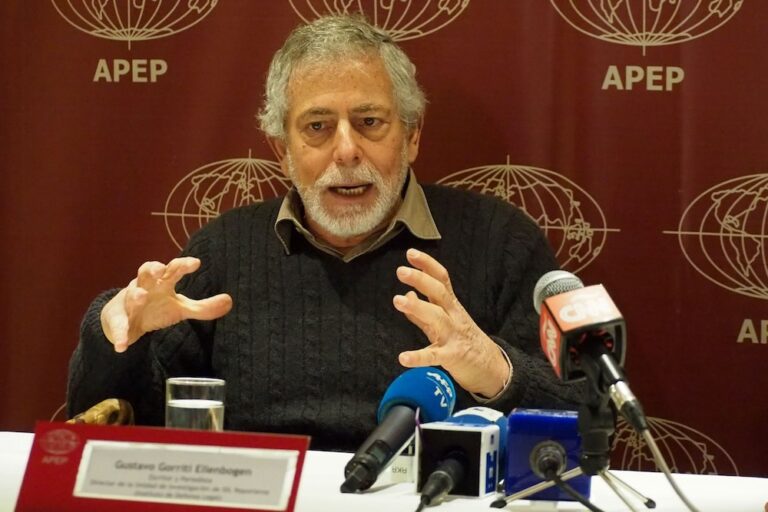(IPYS/IFEX) – On 4 October 1999, the USA House of Representatives passed House Resolution 57, expressing its concern over the Peruvian judicial and electoral institutions’ lack of independence and over the “strong intimidation” of journalists in Peru. **For background on the Ivcher case, see IFEX alerts of 12 August, 16 July, 14 July, 11 June, […]
(IPYS/IFEX) – On 4 October 1999, the USA House of Representatives passed
House Resolution 57, expressing its concern over the Peruvian judicial and
electoral institutions’ lack of independence and over the “strong
intimidation” of journalists in Peru.
**For background on the Ivcher case, see IFEX alerts of 12 August, 16 July,
14 July, 11 June, 7 June, 2 June, 28 May, 21 May, 17 May, 20 April and 8
April 1999, 2 December 1998 and others**
The resolution states that “the Special Rapporteur for Freedom of Expression
of the Organisation of American States has called on the Peruvian government
to put an end to the harassment of journalists and to investigate and bring
to trial all abuses against freedom of expression and the press.” The
document further notes that “Freedom House currently classifies Peru as the
only country in the western hemisphere, apart from Cuba, without a ‘free
press’.”
The resolution echoes the USA State Department’s report on Human Rights in
Peru for 1997, issued on 30 January 1998. Particular mention is made of the
case of Baruch Ivcher, majority shareholder of the Canal 2 television
station.
As the resolution recounts, the State Department concluded in its report
that “the government’s action in this case was seen as a clear attempt to
prevent Canal 2 from continuing to report negatively on the regime,” The
State Department based this assertion on the fact that the government
stripped the businessman of his Peruvian citizenship, and subsequently
prohibited him from running Canal 2, by invoking a law that impedes
foreigners from owning media.
The House of Representatives further took into account that the Peruvian
regime created a special court via which to prosecute Ivcher for alleged
taxation offences, using legal procedures “qualified by experts on Peruvian
law as clearly irregular and constituting political interference into
judiciary matters.” The fact that INTERPOL was asked by Alberto Fujimori’s
government to execute an order for Ivcher’s capture and that an
investigation intended to prosecute the businessman’s closest family members
had been launched, also influenced the House of Representatives’ decision.
The resolution coincides with the State Department report in stating that
“the incidents of harassment against media workers increased to such an
extent, as to suggest the existence of an organised intimidation campaign by
the government and specifically by the armed forces and the intelligence
service.”
The document notes “USA representatives in Peru and in international
organisations, including the Organisation of American States, the World
Bank, the Inter-American Development Bank and the International Monetary
Fund, should ensure that the USA’s concern over the threats to democracy and
violations of the law in Peru is clearly understood.”
According to the document, the Lower House recommends that “the United
States and other members of the Americas community should review the
upcoming report of the OEA’s Inter-American Commission on Human Rights’
independent investigation on the state of, and threats to, democracy, press
freedom, and independence of the judiciary in Peru.”
On 11 February, Resolution 57 was tabled by Republican Congressman Benjamin
Gilman, on behalf of Gilman and his colleague, Democrat Samuel Gedjenson.
The document was subsequently edited, debated and finally approved on 1 July
by the International Relations Committee.


